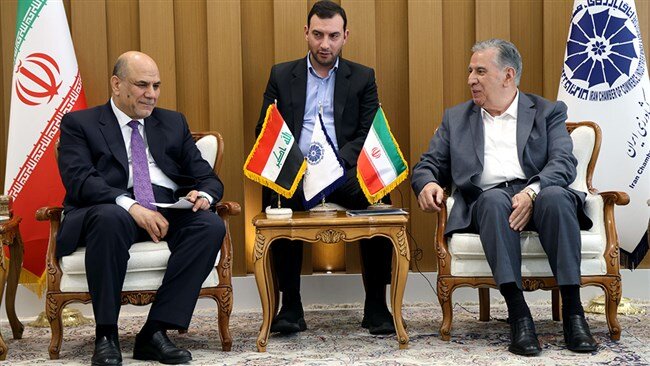Iran, Iraq eye joint industrial parks, stronger private sector ties

TEHRAN – Iran and Iraq have expressed interest in creating joint industrial parks along their shared border and boosting Iranian investment in the Iraqi market, during a meeting between the Iraqi ambassador to Tehran and the head of Iran Chamber of Commerce, Industries, Mines and Agriculture (ICCIMA).
In a session held on Tuesday between Iraq’s Ambassador to Tehran Naseer Abdul Mohsen Abdullah, and ICCIMA Head Samad Hassanzadeh, both sides stressed the need to establish industrial zones in border regions and to resolve legal disputes between traders by leveraging arbitration mechanisms.
Hassanzadeh called for elevating bilateral trade from the current $12 billion to $20 billion through coordinated efforts.
He said Iran possesses strong industrial, engineering, and technical services capabilities that can support Iraq’s development, adding that Iran is ready to engage in joint investment projects across sectors like food, agriculture, pharmaceuticals, and construction.
He proposed establishing joint production hubs in border industrial parks, producing goods for export to third countries, and called for increased support from both governments to facilitate licenses and approvals for joint operations.
The Iranian side also highlighted infrastructure projects such as the completion of the Khorramshahr-Basra railway and expansion of the Iran-Iraq power grid, along with inviting Iraqi delegations to the Iran Expo 2025 trade fair in May.
Ambassador Abdul Mohsen described the 1,480-kilometer border and vibrant social ties — with 700,000 Iraqis and 120,000 Iraqi students living in Iran — as indicative of deep bilateral connections. Annual cross-border travel now exceeds 155 million visits, he said.
Iraq remains Iran’s largest source of inbound medical tourists. However, the ambassador noted challenges in the organization of Iran’s health tourism sector and called for better regulation to address abuse and improve visitor experiences.
He estimated Iraq’s exports to Iran at $500 million, highlighting a trade imbalance and the need to boost Iraqi exports. Abdul Mohsen argued that joint industrial parks could enhance Iraq’s competitiveness while serving shared economic interests.
Yahya Al-e Es’haq, head of the Iran-Iraq Joint Chamber of Commerce, said both countries could achieve $20 billion in trade and pointed to Iraq’s potential to attract up to $150 billion in annual investment. He emphasized the need to overcome bureaucratic barriers and ensure legal infrastructure for sustainable economic cooperation.
Al-e Es’haq proposed establishing a joint economic union and addressing legal disputes through expanded arbitration cooperation between judicial bodies in both countries.
Iraq’s commercial attaché to Tehran, Aqeel Mousavi, also called for more bilateral economic forums and reiterated support for forming a joint Iran-Iraq chamber of commerce.
Iran exported non-oil commodities valued at $11.9 billion to Iraq in the past Iranian calendar year, which ended on March 20, 2025, according to an official with the Islamic Republic of Iran Customs Administration (IRICA).
Abolfazl Akbarpour, the deputy head of IRICA for planning and international affairs, said that Iraq was Iran’s second top non-oil export destination in the previous year.
Considering Iran's vast export capacity and Iraq’s large market for Iranian goods, both sides want to expand the volume of bilateral economic exchanges.
Iran and Iraq have set a target of $20 billion in annual trade, and businessmen and authorities of both countries are determined to meet that target.
In late May 2024, the head of the Department of Spatial Planning and Regional Planning of the Iranian Planning and Budget Organization (PBO) said that Iran exports some 2,200 products, valued at $12 billion, to neighboring Iraq annually.
Speaking in a meeting entitled “Reviewing opportunities and challenges of attracting Iraqi investors and strengthening trade relations between the two countries in line with demarcating Iran in the regional value chain”, Jafar Hosseini said that Iraq, benefiting from $85 billion foreign currency reserves, 130 tons of gold reserves, and 147 billion barrels of proven reserves of crude oil, is among the richest countries in West Asia.
Currently, Iran exports over 2,200 various types of goods and products to Iraq, he said, adding that more than half of the active Iranian traders are present in the Iraqi market.
Developing the trade infrastructures to facilitate trade between the two countries, encouraging traders to invest in Iraq, promoting trade through dispatching and admitting trade delegations and participating in exhibitions of the two countries, etc. are suggested to strengthen the trade and economic relations between Iran and Iraq, he underlined.
In an interview in mid-December last year, the ambassador of Iran in Iraq praised the economic relations between the two sides and expressed hope that these relations will be more and better.
Mohammad Kazem Ale-Sadeq announced the value of commercial exchanges between the two countries, and stated that economic relations between Iran and Iraq are very good, and expressed hope that these relations will improve.
The envoy further noted: “Iraq is an important country in the region, and we have very important economic, political, and social relations with this neighbor.”
In early May 2024, Tehran hosted the 6th meeting of the Iran-Iraq Joint Economic Committee.
The two-day event was co-chaired by the former Iranian Finance and Economic Affairs Minister Ehsan Khandouzi and Iraqi Minister of Commerce Atheer Daoud Al-Ghurairi.
On the first day of the meeting, specialized committees including commercial, industrial, agricultural, standardization and quality control, energy, finance, banking, investment and Insurance, shipping, transport, and Customs, scientific, educational, tourism, health, as well as sports consulate held meetings to discuss areas for cooperation.
Increasing non-oil exports to the neighboring countries is one of the major plans that the Iranian government has been pursuing in recent years.
Iran shares land or water borders with 15 countries namely the United Arab Emirates (UAE), Afghanistan, Armenia, Azerbaijan, Bahrain, Iraq, Kuwait, Kazakhstan, Oman, Pakistan, Qatar, Russia, Turkey, Turkmenistan, and Saudi Arabia.
EF/MA
Photo: ICCIMA Head Samad Hassanzadeh (R) and Iraq’s Ambassador to Tehran Naseer Abdul Mohsen Abdullah
Leave a Comment